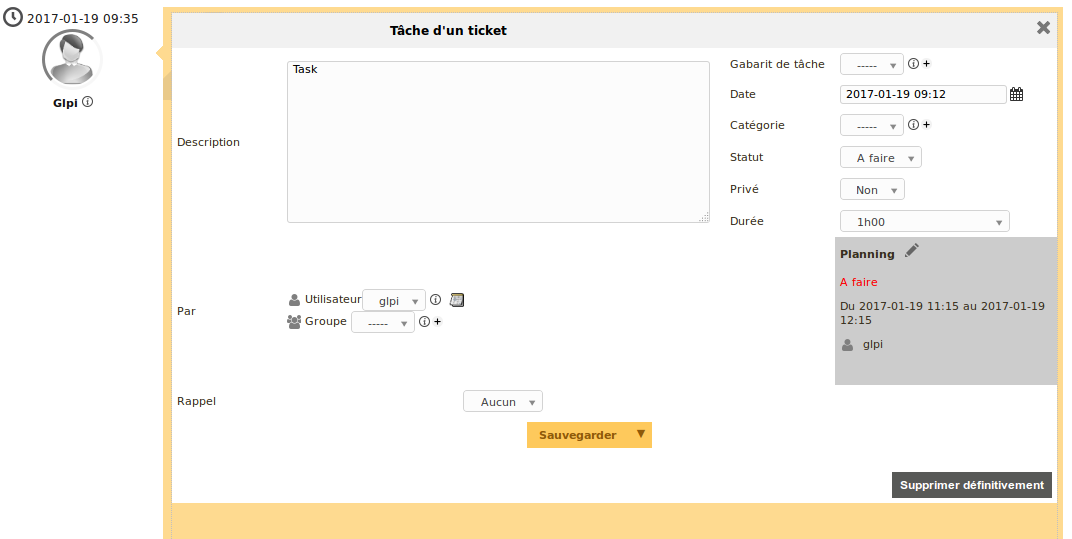Please check if the feature has not already been requested.
If not, please describe it

 Number of processor's core used vs total number
Number of processor's core used vs total number
The number of processor's cores as returned by FusionInventory is the number of used cores.
It's possible to disable some core in the bios. In this case, dmidecode return the information of the total number of cores.
One example is Oracle Database appliances, where cores may be disabled for licensing issues.
It would be interesting to a new field to store the total number of cores.

 add fields unicity
add fields unicity
Hello,
It's possible to add two fields unicity ip address and mac address with the object network ?
Thanks for your answer
Best regards,

 Planning: enhance planning date change
Planning: enhance planning date change
Hi,
An enhancement of a task's planning date would be nice. Unless someone tells you to or you look in the code, you can't guess that you can click to edit the date. See screenshot for a proposal, but I'm not a designer, so feel free to enhance it.


 Add a hook for plugins to add HTML code on pages
Add a hook for plugins to add HTML code on pages
`Html::includeHeader()` offers hooks for plugins to add CSS and JavaScript assets (via `$PLUGIN_HOOKS['add_css']` and `$PLUGIN_HOOKS['add_javascript']`) but nothing for plain HTML code (static or dynamically generated).
Modifying `Html::footer()` would allow plugins to add code on/as footer.
More method are impacted because some are dedicated to the help pages, modal/pop-up, etc.
I suggest adding hooks (say `$PLUGIN_HOOKS['add_code_in_header']` and `$PLUGIN_HOOKS['add_code_in_footer']`) for the plugin to allow more customization of GLPI general interface.
In my case, I am building a plugin to add snippets of plain HTML codes (disclaimers, notes, analytic trackers, etc.) on any pages.

 Bouton "Enregistrer et fermer"
Bouton "Enregistrer et fermer"
Bonjour,
il serait bon d'ajouter un bouton "enregistrer et fermer" pour chaque formulaire (ticket, ordinateurs, imprimantes,...). A chaque modification, on ne veut pas forcement rester sur le formulaire mais revenir au résultat de notre recherche.

 add picture for knowledge base on home page
add picture for knowledge base on home page
Hello
It would be relevant to add a picture next to the first word of entries of knowledge base
image -
word tips

 IP filtering for SSO auth
IP filtering for SSO auth
Define a whitelist of IP or host that are able to use autologin function

 notification per entity
notification per entity
Hello everyone
I did not see that request.
How is working the mail notification when using same recipients on differents entities ?
I.E. : if I use 2 entities named root and root2.
Recipients in Ticket Notification template are Admin and technician
Users sends mail to helpdesk and if no rule is set, so what's about the notification ? The technician will receive twice mail notification saying "New Ticket" ?
So my request would be if we could set Notification template (i.e. : for New ticket) per entity ?

 Trucate RSS feed item mouseover
Trucate RSS feed item mouseover
Currently large RSS items are not displayed well when moused over. I suggest truncation. 0.90.5
Customer support service by UserEcho


